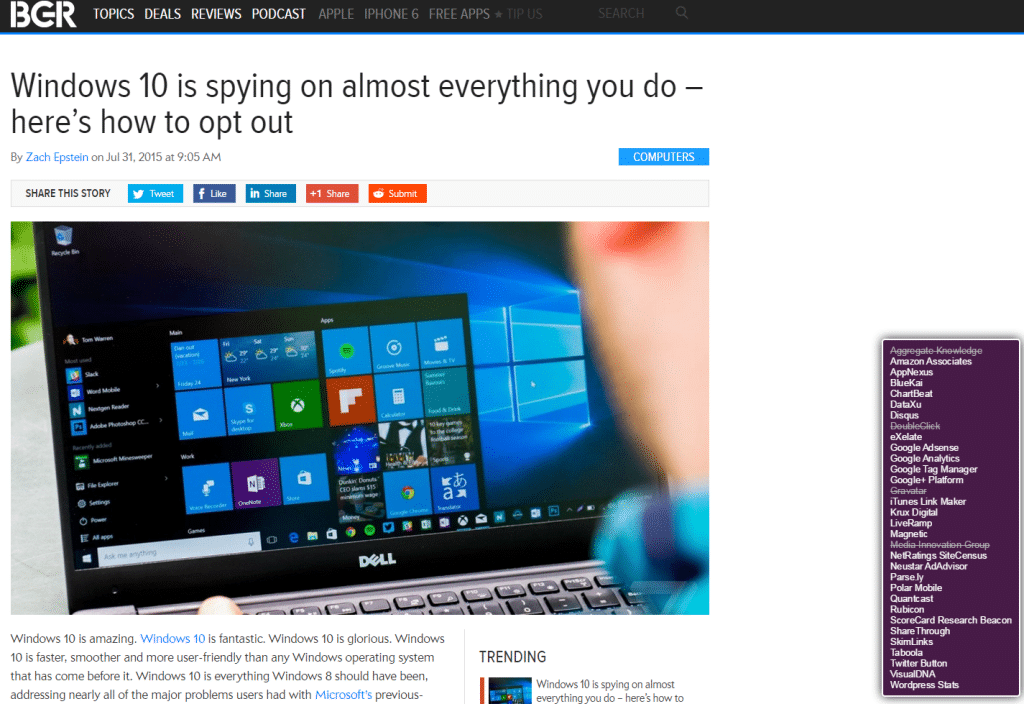BGR.com recently ran a fear mongering article about Windows 10 claiming it was spying on you. When the article reached the front page of Reddit’s /r/Technology sub-reddit users began pointing out just how inaccurate the article was.
“I feel like most of these features were mentioned when I installed Windows 10.” – BlackhawkGS
“This is something I seriously don’t understand…
All other giant tech companies do the same thing. Google, Apple, Dropbox, Facebook, etc have been doing this for years. The biggest difference being that Microsoft is attempting HELP users understand what going on in the background in relatively simple terms and making it easy to customize yourself, whereas the previous norm was to just throw a giant TOS that people blindly accept. Also, Microsoft has been in a constant legal battle with the government trying to PROTECT peoples e-security (in addition to several tech companies)” – greysplash
“FFS, Windows is not spying on you. I’m so annoyed at this scaremongering. My fiancé sent me a similar article right before I installed 10 on our laptop. On the second page when doing the install, there is a link that lets you customize your privacy settings. You don’t have to hit the button to go with the express settings, there is literally a link to configure them on the second page before Windows is even installed. It’s the one immediately after “Hi there, welcome back!” with your user name.” – Anna_Draconis
Redditors piled on to BGR pointing out that Google, Apple, and Facebook also require a lot of personal information and track much of what you do sharing it with their cloud-based algorithms. For example your Google Android phone tracks your location at all times, has access to your contact list and emails, and knows what you search for. This information helps it power the Google Now app that comes pre-installed on all new Android phones. Similarly Microsoft’s Windows 10 is asking for permission to use information that it’s various programs such as Cortana need to improve your life and make a seamless experience.
So why then make an article scaring users about Windows sharing information that would make your experience better and that is in the same vein as normal technology of the day (though Microsoft does so far seem more adept at protecting people’s privacy)? Answer: It’s all about the Benjamin’s baby. The more BGR.com can coax users to share a salacious story with loved ones and friends scaring them about the what the evil Microsoft is up to, the more clicks they can get on their article, and the more of that sweet advertising cheddar they can enjoy.
And that’s where BGR.com becomes a total hypocrite. Because to get that sweet rich man’s cabbage, they allow various third parties to track you and use that data to better position their publication to advertisers and display ads to users. The list of companies getting a piece of this data are; Google, Apple, Automatic (WordPress), Amazon, Twitter, Oracle (BlueKai), Neilsen (eXelate, SiteCensus), Neustar, Taboola (possibly exposing data to Baidu), Imagini Europe, ScoreCard Research, and more.. Notice one major tech company’s name not listed? Microsoft. The one company that doesn’t seem to offer any trackers to BGR.com to help them monetize their content.
Now I’m not saying that this is all related and BGR.com is going to bat against the one company in tech not helping them make money, but I am saying that BGR.com and their partners, like most other websites and publishers – are tracking your movements to help improve your experience and their revenue. And that makes this article they wrote completely hypocritical of them.
BGR, I get it. Scaring people makes them share and click, and clicks make you money. But isn’t it time this era of the internet ended? Can we stop spreading false information via salacious titles just because we know a bunch of people who don’t know better will share them? Please? for all of our sanity.

If you’d like to see how BGR.com and other websites track you, check out the Ghostery plugin for FireFox or Chrome
